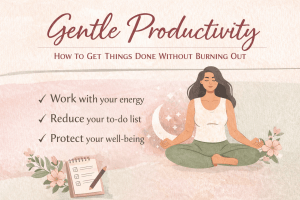Are you a chronic dieter? Do you shift from one diet to the other only to find that you’ve gained back your lost weight? Well, there’s a way out.
It’s called intuitive eating, which is a simple process of honoring your health by listening to your body to meet your physical and psychological needs.
Have you ever heard of it? Will it help you to reduce weight and stay away from diet culture?
Without much ado, we’ll jump straight into all the exciting information about intuitive eating.
If you want to know more about intuitive eating read this interesting book Intuitive Eating Work Book: Ten Principles For Nourishing a Healthy Relationship With Food
What is Intuitive Eating
Intuitive eating is a framework that connects emotion, instinct, and rational thinking. It’s a mind-body approach to self-care and comprises of ten principles.
These principles either help you cultivate or remove obstacles to body awareness, called interoceptive awareness.
The intuitive eating practice is the brainchild of two dieticians Evelyn Tribole and Elyse Resch. It contains a validated assessment scale and over a hundred studies to support it.
To eat intuitively, first, you have to know the difference between emotional and physical hunger.
Physical hunger: It signals you to replenish the nutrients by sending different signals such as fatigue, irritability, or growling stomach.
Emotional hunger: This type of hunger is caused due to an emotional need. Loneliness, boredom, and sadness can create food cravings of comfort foods. Eating to satisfy emotional hunger causes self-hatred and guilt.
If you want to know more about this healthy way of eating you’ll get complete information from this book titled Intuitive Eating.
Intuitive eating principles
Here are the ten principals of intuitive eating. Though simple they can bring a massive positive outlook to your entire being.
#1. Reject the diet mentality
Intuitive eating is anti-diet. Many research studies have pointed out that dieting increases your risk of gaining weight. Alternatively, this self-care eating practice helps you to develop a positive association with foods.
#2. Honor your hunger
Start eating healthy foods when you feel the early pangs of hunger. If you avoid those initial hunger signals, then you might overeat.
#3. Make peace with food.
Enjoy healthy and varied foods, even those that are not acceptable by other diets. When you’re feeling full and satisfied, they may not seem so appealing.
#4. Challenge the food police
Challenge your thoughts that tell whether your food is good or bad. This practice is an essential step to become an intuitive eater.
#5. Feel the fullness
Just as your body sends signals of hunger, so does it sends signals when you’re full. When you’re satisfied and feel full, listen to those signals, and stop eating even if you have to say no to dessert or leave food on your plate. On second thoughts to stop food wastage, practice portion control.
#6. Discover the satisfaction factor
Enjoy your food! Have a hearty meal. Relax and eat without rushing, making eating a pleasurable activity. When you relish what you eat and be mindful, you’ll eat less.
#7. Cope with your emotions with kindness
Emotional eating may lead to weight gain. Sometimes you may start to eat comfort food to cope with your emotions.
Try to deal with your emotions constructively by taking a walk, chatting with a friend meditating, or journaling or busying yourself in some hobby. These coping skills make you an efficient, intuitive eater.
#8. Respect your body
Let go of unrealistic expectations about your body and stop criticizing its looks and what you perceive wrong with it. Know that you’re beautiful, just the way you are.
#9. Movement-Feel the difference
Instead of exercising to lose calories, make movement a part of your routine by doing what you enjoy––walking, running, dancing, team games, or gardening, rather than forcing yourself to do things that you don’t want.
#.10 Honor your health-Gentle nutrition
Your overall food patterns shape your health. So enjoy good food that makes you feel great.
Constant dieters have a vast knowledge about the fat, calories, and carbohydrate content of different foods, so much so that they forget the joy of eating.
Go in for nutritious, tasty, and satisfying foods and make healthy eating a daily habit.
One meal or one snack won’t make or break your health. Be aware that consistent healthy eating patterns bring about positive changes in the long run.
Benefits of intuitive eating
More than 100 research studies have pointed out the benefits of intuitive eating
The studies show that intuitive eating is linked with
- Higher life satisfaction
- Better body image
- Optimism and wellbeing
- Higher self-esteem
- Lower body mass index
- Higher HDL cholesterol levels or the good cholesterol
- Proactive coping skills
- Lowered rates of disordered and emotional eating
Intuitive eating weight loss
This eating practice is not a weight loss diet, nor was it intended to be. That’s why there are three possible outcomes in intuitive eating. You can lose weight, gain weight, or remain the same.
Intuitive eating does not focus on weight loss; instead, it helps you focus on things you can control like behavior change and having a peaceful relationship with food.
Intuitive eating results
For this topic, let’s take some real-life examples.
Take the case of Caroline Praderio. She writes in Insider that she wanted to lose those extra pounds, which she gained during her Freshman year of college.
Adhering to her goal, she started cutting on bad foods and started measuring every morsel of food. She even refused to go dinner with her family if the restaurant didn’t post nutritional information.
All these gave way to recurrent late-night binges. By luck, in her early 20’s, she heard about intuitive eating, developed a positive relationship with food––and now enjoys a healthy lifestyle.
Another real-life example
Shelli Johnson didn’t want to deal with her emotions, so she distracted herself with food. She tells People’s magazine that she was overweight by the age of 5. Her attempts of restrictive eating turned into bulimia at the age of 13.
She was even bullied in school. She hit her highest weight, 304 Ibs, when she was pregnant with her first son. One fine day, she heard about intuitive eating, developed a healthy relationship with food, and got down to her current weight of 130 lbs.
Johnson says after she followed this self-care eating practice, her self-esteem improved, and now she’s a happy person.
Intuitive eating tips: How to start intuitive eating
Intuitive eating helps you to eat without guilt and breaks the misconception that certain foods are bad.
With this healthy eating practice, you abide by your gut feelings of hunger, fullness, and satisfaction rather than bowing to external rules of dietary restrictions.
Here are some useful tips to start this eating practice.
- Allow all foods that you like
- Try to get enough nutrition from your food to maintain health.
- Recognize and honor your hunger
- Stop eating when you feel full.
- Honor your taste preferences and notice how they bring you a feeling of satisfaction after eating food.
- Engage all your senses while eating, and you’ll less likely overeat.
- Take in a few moments each day to check in with the feelings of your body. This practice is called body awareness.
- Practice mindfulness
- Know that you’re strong enough to deal with your feelings without practicing any negative coping mechanism.
- Employ healthy coping mechanisms to deal with stress.
- Enjoy movement, whether it be walking, cycling, or strolling in the woods.
- Practice self-care, it might be meditating, enjoying a hot cup of coffee, catching up with friends, or doing anything that makes you happy.
- Cultivate joy
- Create a gratitude journal
- Stay hydrated.
- Find healthy ways to cope with your emotions.
- Surround your self with positive anti-diet environments.
Intuitive eating journal
A food journal is a simple diary, or if you’re working with a dietician, it can be a series of printed sheets where you record what you eat.
A food journal usually contains the following list.
- Time of meal or snack
- The foods consumed
- Hunger level before and after eating food
- It’s not essential to record portion sizes.
- Emotions after eating food
- Any physical sensations felt, including feeling full, increased energy, satisfied, lethargy, pain, bloating, or discomfort.
Here’s another great book about intuitive eating give it a try Intuitive Eating: A Revolutionary Anti-Diet Approach
Pros and cons of keeping an intuitive food journal
Pros
- Increase awareness of hunger and fullness cues
- Helps identify unhealthy eating patterns
- Help identify whether you’re using food as a coping mechanism.
Cons
- Journalling may be a source of added stress.
- Can become addictive
- May lead to feelings of guilt or shame.
- May affect food choices that may slow progress with intuitive eating.
Nutritionists say that you may use food journaling at the start of the intuitive eating period. Once you get the hang of it, you may leave it and follow your natural cues.
Here’s an PDF of intuitive eating template from weight management psychology
Intuitive eating before and after
Here’s a real-life story of Char-Lee-Cassel, an intuitive eating coach who journaled her feelings before and after her intuitive eating experience.
Ideas about healthy eating
Before intuitive eating
Eat a few calories as possible.
To eat a healthy diet, I should follow strict rules.
After intuitive eating
I will eat plenty of food that will bring me joy, energy, and pleasure.
I listen to my body to make food choices instead of following a set of rules.
Response to hunger
Before intuitive eating
I feel hungry. I’ll drink a glass of water; maybe I’m thirsty.
I’ll wait for it until it is time to eat.
After intuitive eating
I feel hungry. I’ll eat what sounds good and get on with my life.
Response to exercise
Before intuitive eating
Exercising is a way to prove my worth and value.
My workout should last a certain amount of time.
After intuitive eating
All movement counts, and it must be enjoyable.
My body image
Before intuitive eating
I’ll accept my body only if it’s perfect.
After intuitive eating
I accept my body as it is.
Final thoughts
With intuitive eating, what you eat is as important as how you eat. Following your hunger and fulness cues may help you have a healthy relationship with food, have a positive body image, and improve your life quality.














